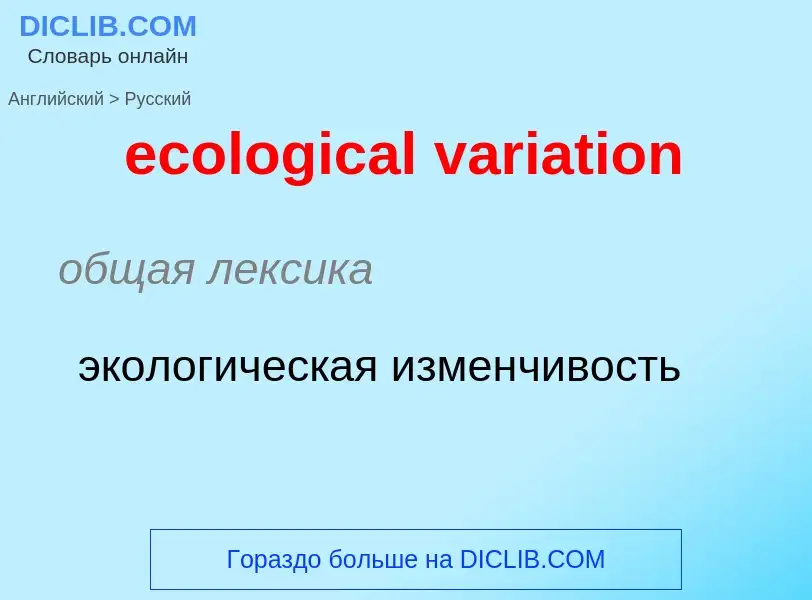Μετάφραση και ανάλυση λέξεων από την τεχνητή νοημοσύνη ChatGPT
Σε αυτήν τη σελίδα μπορείτε να λάβετε μια λεπτομερή ανάλυση μιας λέξης ή μιας φράσης, η οποία δημιουργήθηκε χρησιμοποιώντας το ChatGPT, την καλύτερη τεχνολογία τεχνητής νοημοσύνης μέχρι σήμερα:
- πώς χρησιμοποιείται η λέξη
- συχνότητα χρήσης
- χρησιμοποιείται πιο συχνά στον προφορικό ή γραπτό λόγο
- επιλογές μετάφρασης λέξεων
- παραδείγματα χρήσης (πολλές φράσεις με μετάφραση)
- ετυμολογία
ecological variation - translation to ρωσικά
общая лексика
экологическая изменчивость
[ve(ə)ri'eiʃ(ə)n]
общая лексика
вариация
изменчивость
изменение
вариационный
варьирование
колебание
колебательность
магнитное склонение
неравномерность
отклонение
разновидность
ход зависимости
нефтегазовая промышленность
отклонение (от номинальной величины)
Смотрите также
существительное
общая лексика
изменение
перемена
варьирование
колебание
разновидность
вариант
отклонение
изменение, перемена
склонение магнитной стрелки
специальный термин
вариация
физика
магнитное склонение
грамматика
флексия
биология
аберрация
генетическая изменчивость
мутация
Ορισμός
Βικιπαίδεια
Ecological indicators are used to communicate information about ecosystems and the impact human activity has on ecosystems to groups such as the public or government policy makers. Ecosystems are complex and ecological indicators can help describe them in simpler terms that can be understood and used by non-scientists to make management decisions. For example, the number of different beetle taxa found in a field can be used as an indicator of biodiversity.[1][2][3]
Many different types of indicators have been developed. They can be used to reflect a variety of aspects of ecosystems, including biological, chemical and physical. Due to this variety, the development and selection of ecological indicators is a complex process.[4]
Using ecological indicators is a pragmatic approach since direct documentation of changes in ecosystems as related to management measures, is cost and time intensive.[5][6] For example, it would be expensive and time-consuming to count every bird, plant and animal in a newly restored wetland to see if the restoration was a success. Instead, a few indicator species can be monitored to determine the success of the restoration.
- "It is difficult and often even impossible to characterize the functioning of a complex system, such as an eco-agrosystem, by means of direct measurements. The size of the system, the complexity of the interactions involved, or the difficulty and cost of the measurements needed are often crippling"[7]
The terms ecological indicator and environmental indicator are often used interchangeably. However, ecological indicators are actually a sub-set of environmental indicators. Generally, environmental indicators provide information on pressures on the environment, environmental conditions and societal responses. Ecological indicators refer only to ecological processes; however, sustainability indicators are seen as increasingly important for managing humanity's coupled human-environmental systems.
Ecological indicators play an important role in evaluating policy regarding the environment.
Indicators contribute to evaluation of policy development by:[8]
- Providing decision-makers and the general public with relevant information on the current state and trends in the environment.
- Helping decision-makers better understand cause and effect relationships between the choices and practices of businesses and policy-makers versus the environment.
- Assisting to monitor and assess the effectiveness of measures taken to increase and enhance ecological goods and services.
Based on the United Nations convention to combat desertification and convention for biodiversity, indicators are planned to be built in order to evaluate the evolution of the factors. For instance, for the CCD, the Unesco-funded Observatoire du Sahara et du Sahel (OSS) has created the Réseau d'Observatoires du Sahara et du Sahel (ROSELT) (website [9]) as a network of cross-Saharan observatories to establish ecological indicators.

